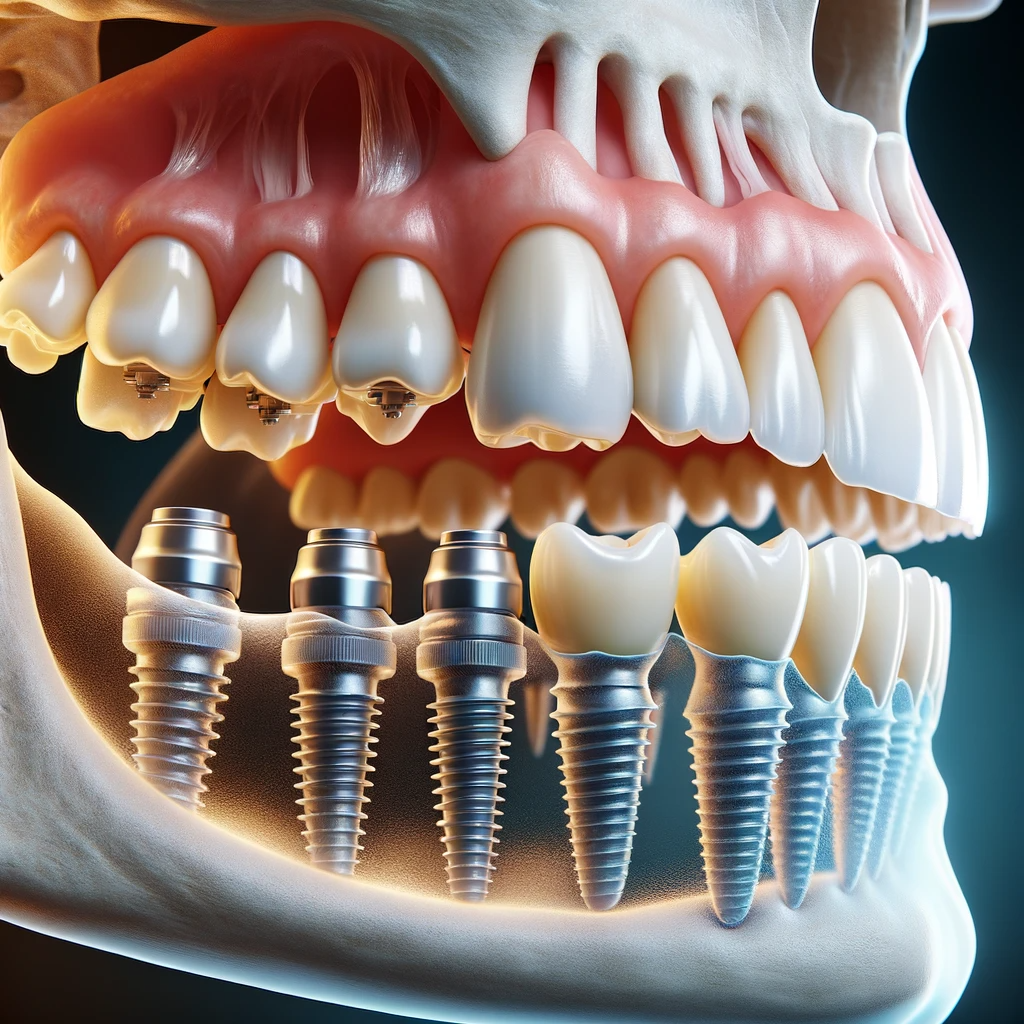Things about Dental Sense
Things about Dental Sense
Blog Article
What Does Dental Sense Mean?
Table of ContentsDental Sense - The FactsDental Sense Can Be Fun For EveryoneDental Sense Things To Know Before You BuySome Of Dental Sense
are medical devices operatively implanted right into the jaw to bring back an individual's capacity to chew or their appearance. They offer support for artificial (fake) teeth, such as crowns, bridges, or dentures. When a tooth is lost as a result of injury or illness, a person can experience problems such as quick bone loss, malfunctioning speech, or adjustments to chewing patterns that lead to discomfort.Oral implant systems consist of a dental implant body and oral implant abutment and may likewise consist of an abutment addiction screw. Dental implants. The oral implant body is operatively put in the jawbone instead of the tooth's origin. The oral implant joint is typically connected to the implant body by the joint fixation screw and expands via gum tissues into the mouth to sustain the connected man-made teeth
(https://www.pageorama.com/?p=dentalsense1)Framework of The Dental Implant System choosing dental implants, talk to your dental supplier regarding the possible advantages and risks, and whether you are a candidate for the procedure. Things to think about: Your overall health and wellness is a crucial consider figuring out whether you are a great candidate for oral implants, how much time it will require to heal, and how much time the implant may remain in location.
Smoking cigarettes may influence the healing process and reduce the long-term success of the dental implant. The healing procedure for the dental implant body might take several months or longer, throughout which time you typically have a short-term abutment in place of the tooth. the oral implant procedure: Carefully comply with the dental health guidelines provided to you by your dental service provider.
The Basic Principles Of Dental Sense
Implant failing can cause the demand for one more surgical treatment to repair or replace the dental implant system. Brings back the capability to eat Brings back aesthetic look Assists keep the jawbone from reducing because of bone loss Maintains the health of the bordering bone and gums Helps maintain nearby (neighboring) teeth secure Improves high quality of life Damages to bordering natural teeth throughout dental implant positioning Injury to the surrounding cells throughout surgical procedure, such as sinus opening Injury during surgical treatment (as an example, crack of surrounding jawbone) Insufficient feature, such as really feeling like the teeth do not attack together normally A feeling that the tooth is loose or twisting in area arising from an abutment screw loosening up Implant body failure (looseness of the implant body) due to systemic infection, which may be a lot more most likely in patients with uncontrolled diabetes due to neighborhood infection in bone and gums supporting the dental implant body as a result of postponed healing, which might be more probable in individuals that smoke Problem cleaning up the periodontals around the implant, resulting in bad oral health Untreated periodontal illness Post-surgical feeling numb as a result of nerve impingement or damages Always inform healthcare providers and imaging service technicians that you have oral implants before any kind of magnetic resonance imaging (MRI) or x-ray treatments.
FDA is not familiar with any adverse occasions reported for MRI or x-ray procedures with oral implants. Dental implants systems are typically constructed from materials that comply with international agreement standards of the International Organization for Standardization (ISO) or ASTM International. These requirements have details of what makes a secure material.

An oral implant is a structure that changes a missing tooth. With screw-like devices, the surgeon inserts an implant into the jawbone, and it serves as an anchor for a synthetic tooth, called a crown. A tool called a joint attaches the fabricated tooth to the dental implant. The crown is custom-made to fit the individual's mouth and match the shade of their teeth.
What Does Dental Sense Mean?
Some people are not eligible for oral implant surgical procedure. It is for oral doctors to operate on people with: intense illnessuncontrollable metabolic diseasebone or soft cells disease or infectionIf these issues are settled, an individual can have the surgical procedure. In, dental specialists avoid operating individuals with: If people with any one of the above undertake oral implant surgical procedure, there is a higher risk of the implant failing.

Oral implant surgery is a customized process. It's not the same for every person. The adhering to provides a basic summary of what you can expect your dental professional, dental cosmetic surgeon, periodontist or prosthodontist to do: Place the dental implant operatively. Offer you time to recover. web link Affix the article and final crown, bridge or denture.
Next off, your doctor will meticulously put the dental implant right into your jaw. If your implant is near the front of your mouth, your dentist will make a temporary tooth for you to put on until you recover.
The smart Trick of Dental Sense That Nobody is Discussing
During the healing stage, your jawbone must fuse to the dental implant. This process can take anywhere from three to 9 months.
When your implant heals, your dental practitioner can connect the joint (small connector message) and your last reconstruction (crown, bridge or denture). This normally takes regarding one hour to complete and may need a 2nd minor surgery. You shouldn't feel any kind of pain throughout your dental implant treatment because your provider will make use of drug to numb your gums.
Report this page